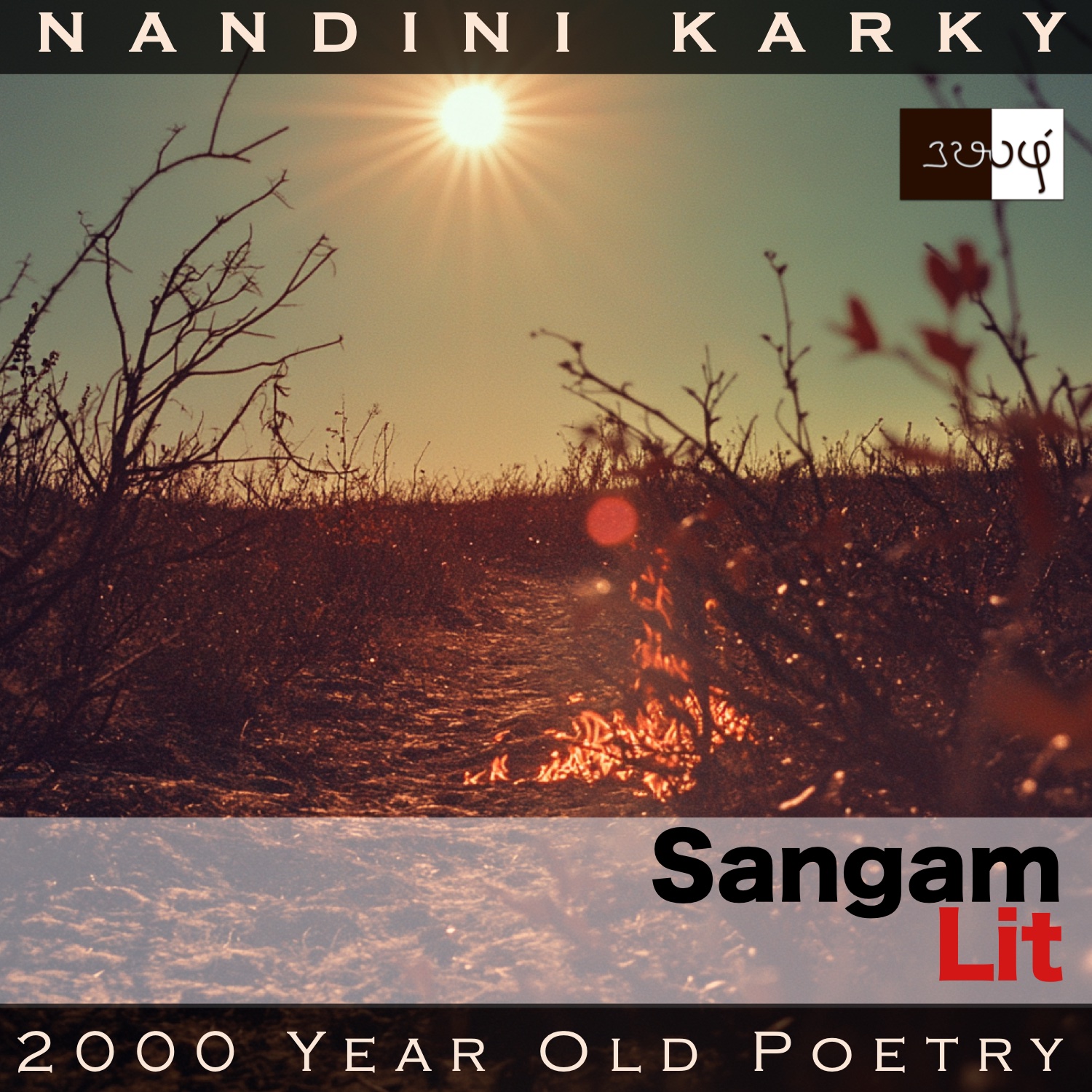Podcast: Play in new window | Download
Subscribe: Apple Podcasts | Spotify | Amazon Music | Android | iHeartRadio | TuneIn | RSS | More
In this episode, we perceive the deep love in the lady for the man who has parted away, as portrayed in Sangam Literary work, Kalithogai 16, penned by the Chera King Paalai Paadiya Perunkadunko. The verse is situated in the ‘Paalai’ or ‘Drylands landscape’ and reveals nuanced perspectives about seeking the help of gods.

பாடு இன்றிப் பசந்த கண் பைதல பனி மல்க,
வாடுபு வனப்பு ஓடி வணங்கு இறை வளை ஊர,
ஆடு எழில் அழிவு அஞ்சாது, அகன்றவர்திறத்து, இனி
நாடுங்கால், நினைப்பது ஒன்று உடையேன்மன்? அதுவும்தான்
தொல் நலம் தொலைபு, ஈங்கு, யாம் துயர் உழப்பத் துறந்து, உள்ளார்,
துன்னி, நம் காதலர், துறந்து ஏகும் ஆர் இடை,
‘கல்மிசை உருப்பு அறக் கனை துளி சிதறு!’ என,
இன் இசை எழிலியை இரப்பவும் இயைவதோ?
புனையிழாய்! ஈங்கு நாம் புலம்புற, பொருள் வெஃகி,
முனை என்னார் காதலர் முன்னிய ஆர் இடை,
‘சினை வாடச் சிறக்கும் நின் சினம் தணிந்தீக!’ என,
கனை கதிர்க் கனலியைக் காமுறல் இயைவதோ?
ஒளியிழாய்! ஈங்கு நாம் துயர் கூர, பொருள்வயின்,
அளி ஒரீஇக் காதலர் அகன்று ஏகும் ஆர் இடை,
‘முளி முதல் மூழ்கிய வெம்மை தீர்ந்து உறுக!’ என,
வளி தரும் செல்வனை வாழ்த்தவும் இயைவதோ?
என ஆங்கு,
செய் பொருட் சிறப்பு எண்ணிச் செல்வார்மாட்டு, இனையன
தெய்வத்துத் திறன் நோக்கி, தெருமரல் தேமொழி!
‘வறன் ஓடின் வையகத்து வான் தரும் கற்பினாள்
நிறன் ஓடிப் பசப்பு ஊர்தல் உண்டு’ என,
அறன் ஓடி விலங்கின்று, அவர் ஆள்வினைத் திறத்தே.
The man’s gone and it’s the confidante’s mission to heal the sorrowful lady! The words can be translated as follows:
“Making my sleepless, pallor-filled eyes well with the tears of suffering, my beauty to fade and vanish as my bangles slip away from my forearms, he left without fearing the ruin to my beauty. When I consider his situation now, I think I could do one thing. And that is:
Making my old beauty to be lost, without considering that I would wallow in sorrow, the lover of mine left, desiring wealth, forsaking me. Would it be right if I pleaded to the sweet-voiced clouds upon the path he walks, saying, ‘May you scatter your rain drops abundantly to subdue the heat atop the rocky terrain!’?
O maiden wearing well-etched ornaments, leaving me to lament here, the lover of mine left, desiring wealth, without considering the many obstacles on the way. Would it be right if I ask with sweetness to the thick-rayed sun atop the path he walks, saying, ‘May your fury that withers branches subside!’?
O maiden wearing radiant ornaments, leaving me in deep misery here, the lover of mine left, desiring wealth, without a shred of grace. Would it be right if I praise the lord of the winds that blow upon the path, he walks, saying, ‘May you spread without the heat that burns bushes!’?
Thinking so about the man who left considering only the greatness of gaining wealth, you don’t have to be confused about seeking the grace of these gods, O honey-voiced maiden. Saying, ’On the woman of such chastity, who can make rains pour upon the earth when parched, pallor would spread, ruining the beauty of her skin’, the god of justice ran with haste and removed all the impediments in his mission to seek wealth.”
Time to explore the nuances. The verse is situated in the context of the man’s parting from his lady after marriage, with the intent of seeking wealth. In this verse, there’s a nested structure of words said by the lady, which are repeated and concluded in the confidante’s voice. At first, we hear the lady repeating in different ways how the man’s parting way has affected her, with the core thought that it has made her beauty vanish and her bangles to slip away. She projects the man as someone who did not consider how she would suffer and thought only about his mission to seek wealth. Even with so much thoughtlessness on his part, the lady cannot stop thinking of him and wonders what she could do to make his journey bearable.
In the three-tiered approach that we have become accustomed to, in Kalithogai, she wonders if she should ask the clouds to pour down their drops so that the rocks he walks on, will be cooler and pleasant; if she should ask the sun to not spread its rays so furiously so that the branches can survive with their leaves and save her beloved from the heat; and finally, if she should ask the wind to blow without the heat that burns bushes so that the man’s walk might be a little cooler and pleasant. The confidante repeats these words and tells the lady that there’s no need to be worried and confused about seeking the help of all these gods. A moment to pause here and note that the lady’s confusion was because of the implied fact that it was not considered right for a woman to plead even to the gods for anything, such was their chastity to their husbands! Returning, the confidante remarks on this very quality of the lady, saying her chastity was such that she had the power to make the rains pour on parched earth if she so wanted. And the confidante says that it’s not only her, who thinks so, but the god of justice, who understanding this truth and fearing that pallor would spread on such a chaste lady, had gone and helped the man in every way, removing all hindrances in his path, so that he can finish his mission promptly and return to his noble wife!
A unique verse that reveals the dynamics of a relationship between a married woman and the gods in Sangam times. That’s why even though there’s so much sorrow and suffering on account of the missing man, we don’t see prayers and requests put forth to heavenly entities in Sangam literature, unlike the later eras, when religion dominated these matters in the hearts of separated lovers. Husband above all, even god, seems to be the motto of these Sangam women, according to the words of these ancient poets!




Share your thoughts...